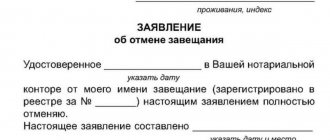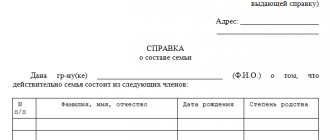Author of the article: Elena Petrenko Last modified: January 2021 13246
According to the law, citizens can inherit any property to both relatives and strangers. This right is regulated by Art. 1119 of the Civil Code of the Russian Federation. No one has the right to interfere with this, and a will for an apartment to a non-relative allows you to distribute shares in the property as the testator needs, while he can deprive family members of their inheritance if they are not allocated the obligatory part.
What does a will give for an apartment?
Drawing up a will allows the testator to dispose of property during his lifetime. Regardless of whether there is a blood connection between the owner and the heir, this is a profitable one-sided transaction for the testator, since the will allows:
- draw up documents without notifying anyone;
- dispose of property with minimal material costs;
- reserve the right to change the will or cancel it in the event of an unforeseen life situation;
- dispose of property at their own discretion, since the rights and obligations of the persons specified in the document will arise only after the opening of the inheritance.
Even a notary may not know about the contents of the document if the will is “closed” - written without his participation and sealed in an envelope with the signatures of 2 witnesses and a notary (Article 1126 of the Civil Code of the Russian Federation).
Until the act comes into force, nothing changes for the legal successors under the will. They cannot claim any property during the owner's lifetime.
The transparency of the procedure for registering a will does not give rise to doubt who will be the heir. If the heirs turned out to be unworthy (committed deliberate illegal actions towards the testator), this can be proven in court.
The procedure for certifying a will for an apartment
The testator can independently draw up a will at any time, but it will receive legal force only after approval. Additionally, the notary registers the will in the unified register, which allows, after the death of the testator, to check information about the availability of the distribution document.
Which notary should I contact?
To approve the will, the testator can choose any notary, regardless of the place of registration and residence. This is due to the fact that after registering a will, all lawyers working in the Russian Federation have access to the register.
In accordance with the requirements of Article 1115 of the Civil Code, the opening of an inheritance is carried out only at the place of last registration of the testator, therefore it will be more convenient for the heirs if the will is drawn up at the place of residence.
The notary certifying the will is obliged to completely preserve the secrecy of the will. Not only is it prohibited to disclose the contents of an administrative document, but also to disclose information about the execution of a will.
List of documents
To draw up an administrative document, the testator must have with him:
- passport;
- document confirming registration;
- receipt for payment of state duty.
To avoid disputes in the future and to prevent the revocation of the will, a person has the right to provide an additional certificate from a narcologist and a psychiatrist confirming the absence of a psychological disorder. So the will is not revoked due to incapacity.
When making a will, regardless of the indication of real estate, a person should not bring documents for this property. Property rights to real estate will be verified by a notary already at the stage of opening inheritance proceedings, since after the execution of a will, until his death, a person has the right to dispose of real estate up to its alienation.
Registration cost
In 2021, when registering a will, the testator will have to pay a state fee, technical and legal services of a notary. In 2021, the state duty is 100 rubles. This amount is approved by the Tax Code and is the same for all participants in legal relations. A state fee is charged for the notary's signature and entering information about the will into the unified register.
Legal services include assistance from a notary in drawing up a distribution document. The cost of a will will depend on whether a person applies to a private or public notary office.
On average you will have to spend 5,000 rubles.
Technical services include making copies, preparing notarial requests, checking draft versions of wills.
2000-3000 rubles will be added to existing costs.
Mandatory share of inheritance
By bequeathing property, it is impossible to infringe on the rights of a socially vulnerable group of the population. Even having determined who will get what, they will be able to claim the inheritance (Article 1148-1149 of the Civil Code of the Russian Federation):
- minor children;
- disabled parents;
- disabled dependents from among the heirs by law;
- disabled dependents living with the testator for at least a year.
Example. Citizen L. bequeathed the apartment to his nurse A. After his death, the officially adopted son L., who had not maintained relations with him for 8 years, began to lay claim to the apartment. The son was an incapacitated disabled person, therefore, in accordance with Art. 1149 clause 1, he received ½ share of the inheritance, which would have been due by law, that is, ½ of the apartment.
A guaranteed transfer of an apartment to another person is possible only through a gift or sale, but then the testator will no longer have the right to dispose of the property.
Having executed a will, the testator will be able to live in the apartment, register other persons there, rent it out, and sell it. No one will be able to claim the property until the opening of the inheritance, which occurs after the death of the testator.
Grandmother wants to bequeath her apartment to a stranger
A will is a document in which a person disposes of his property in the event of death: exactly how and between which people his property, debts and rights should be divided. When there is a will, it does not matter what the law says about the distribution of the inheritance: it will be divided as the owner wanted. Even if other heirs are against it. It’s clear: no one wants to think about their own death in advance. But all people die sooner or later, and then there are two options: either the property is distributed according to the law, or at the request of the deceased.
According to the law, property and debts will be equally divided among the heirs in order of priority. To divide what you have acquired at your discretion and make life easier for everyone, you can make a will. A will comes into force only after death. Unlike a gift or rent agreement, it does not give any rights during the life of the owner.
A will has a lot more power than it seems. A simple piece of paper with your signature and a notary’s stamp can deprive even a close relative of property and allow you to transfer everything to a neighbor and impose restrictions and obligations on the heirs.
Here are some examples of what can be done under a will, but cannot be done without it.
For example, giving the car to your stepson, and not to your own daughter. Let's say there is a certain citizen R. who has his own daughter, stepson and wife. According to the law, after the death of the head of the family, the wife and daughter will receive the inheritance, while the stepson will receive nothing. But the daughter has been living her own life for a long time and does not communicate with her father and mother, but the stepson is a doctor, he helps his stepfather. In a will, a citizen has the right to write directly: an apartment for his wife, a car for his stepson. In this case, the daughter will not get anything.
In the document, the testator can not only dispose of the property, but also indicate what conditions must be met in order to receive it. So, for example, if the testator has no legal successors other than an elderly parent, he can bequeath an apartment to a non-relative, but the condition for receiving housing will be the father or mother living in it.
Mandatory share of inheritance
By bequeathing property, it is impossible to infringe on the rights of a socially vulnerable group of the population. Even having determined who will get what, they will be able to claim the inheritance (Article 1148-1149 of the Civil Code of the Russian Federation):
- minor children;
- disabled parents;
- disabled dependents from among the heirs by law;
- disabled dependents living with the testator for at least a year.
Example. Citizen L. bequeathed the apartment to his nurse A. After his death, the officially adopted son L., who had not maintained relations with him for 8 years, began to lay claim to the apartment. The son was an incapacitated disabled person, therefore, in accordance with Art. 1149 clause 1, he received ½ share of the inheritance, which would have been due by law, that is, ½ of the apartment.
A guaranteed transfer of an apartment to another person is possible only through a gift or sale, but then the testator will no longer have the right to dispose of the property.
Having executed a will, the testator will be able to live in the apartment, register other persons there, rent it out, and sell it. No one will be able to claim the property until the opening of the inheritance, which occurs after the death of the testator.
How to make a will for an apartment for a non-relative
Drawing up a will is not difficult, but if executed incorrectly, the document is considered void, and the heirs will take possession of the apartment by law.
Form and content of the document
In accordance with Art. 1124 of the Civil Code of the Russian Federation, a will must be drawn up in writing and certified by a notary. An exception is the execution of a document in emergency circumstances.
The will for an apartment to a non-relative must reflect:
- date and place of compilation;
- information about the testator: full name, date of birth, place of residence, passport details;
- information about the heirs: full name, date of birth, place of residence, passport details, if there are relatives among the heirs - degree of relationship;
- description of the property being inherited;
- expression of will;
- instructions to familiarize yourself with the contents of Art. 1149 Civil Code of the Russian Federation;
- data on payment of state duty;
- information about the notary;
- indication of the number of copies;
- signature of the testator;
- notarization on the document or envelope containing the will, if it is a closed will.
Sample will for an apartment for a non-relative
The document can indicate: “... I bequeath all movable and immovable property,” “... I bequeath an apartment,” “... I bequeath (specify part, for example, 1/2 or 1/3) a share in the common ownership of (specify part of the property) apartment "
Bequeathing an apartment to a non-relative
A will is a document that a citizen can decide who will receive property after his death.
If, according to the law, only relatives become heirs, according to the order established by the degree of relationship, then the will can determine the successor whom the testator wishes.
This can be a citizen of any age and nationality, legal entity, society, foundation, state, etc.
Important! You can bequeath your property even to an unborn child. It is also possible to transfer property that the testator only intends to acquire
How to make a will?
A citizen can independently draw up a document and sign it with a notary; it is important to comply with all legal requirements regarding the execution of a will. Therefore, in the absence of special knowledge, it is advisable to consult a lawyer
This should be done so that no one can challenge the document.
Example. Citizen Pavlov made a will, in which he assigned his apartment to his childhood friend. After the document was opened, his widow filed a lawsuit with a request to annul the document, since her rights were violated.
Firstly, the apartment was the joint property of the spouses, so half should have remained with the wife. Secondly, she is a disabled person of group II, therefore she was dependent on her husband, that is, she had the right to a compulsory share.
The document is written by the testator in his own hand, except in cases provided for by law. In this case, audio or video recording may be made, and witnesses may be present. After registration, the document must be signed by a notary. Two copies are always drawn up: one is taken by the testator, the second remains in the office archive, and the data is entered into a single register.
Secret execution of a will is also permitted. Moreover, no one except the testator knows its essence. In this case, the notary seals the document in an envelope and puts his signature and seal on it. The envelope can only be opened after the death of the testator.
Important! The notary has no right to disclose the text of the will. Such actions are considered a serious violation and are subject to punishment.
Are there any differences between wills for a relative and for a stranger?
There are no differences. The procedure for completing the document is the same in both cases. However, we must remember that a non-relative in whose favor the will for the apartment was drawn up will have to pay income tax, while a relative does not need to do this. Let us list the basic requirements for the document.
- The will must be written by hand.
- Corrections to the document are not allowed.
- It is mandatory to indicate the full names of the bequeathed property and provide its description, address (for real estate) and other characteristics that allow the item to be identified.
- The use of initials is not allowed, that is, the names, patronymics and surnames of the heirs must be written in full. If possible, your place of residence should also be indicated.
- The date and signature of the testator must be present.
When can a will be contested?
If a document violates the rights of someone, then that citizen has the right to challenge the will. In addition, a will is invalid when:
- it was drawn up by an incapacitated citizen;
- it was written under pressure, fear or blackmail;
- the man was deceived;
- the citizen was not competent at the time of drawing up the will, for example, he was under the influence of drugs or alcohol;
- in it, a person who has committed a criminal act against the testator or his heirs by law is appointed as heir;
- it was composed in a state of shock.
Bequeathing an apartment to a non-relative: legal advice
This issue is resolved individually for each specific case, so before drawing up the document you should consult a lawyer. After reviewing your case, the specialist will help you draw up the document correctly, while avoiding provisions that would allow you to appeal the will in whole or in part.
You can consult around the clock without leaving your home. To do this, you just need to call the hotline or write to the website. No one except the agency employee will know the topic of your conversation. All consultations are conducted strictly anonymously and confidentially.
The procedure for registering a will for an apartment for a non-relative
Necessary requirements for the testator to draw up a will for an apartment to a non-relative:
- reaching 18 years of age;
- capacity;
- presence of an identity card;
- the presence of a privatized apartment in the property.
The notary needs to provide the following documents:
- passport (for non-citizens of the Russian Federation - foreign passport, registration certificate, visa, refugee certificate);
- documents on property rights and place of residence (not necessary, but this will help establish where exactly the property is located and on what basis the will was written in case of a controversial situation).
To prevent the will from being recognized as void, it is advisable to present to the notary a certificate of absence of mental illness on the day of its preparation.
Algorithm of actions
The procedure is as follows:
- Contact a notary at your place of residence.
- Write or print a document with your own hand or with the help of a notary, if there are reasons for this (poor eyesight, illiteracy, etc.). The will must be read aloud if it is written from the words of the testator. The text indicates the reasons why the will was not prepared in person. It is advisable to invite a witness to confirm the actions of the notary. He must sign a document indicating his full name and place of residence.
- Pay the state fee.
In extreme circumstances, the testator, in the presence of two witnesses, must personally write a simple written document on the disposition of property after death (1129 of the Civil Code of the Russian Federation). It will later be confirmed in court by interested parties during the period of acceptance of the inheritance.
If a will written in emergency circumstances is not certified by a notary within a month after the threat to life has been eliminated, it is considered invalid.
Wills signed by:
- doctor (chief, duty doctor), if the person is in a hospital, nursing home;
- captain - for people on a voyage;
- station chiefs - for expedition members;
- commander of a military unit - for military personnel;
- chief - for people in prison.
A witness must be present when signing. Afterwards, the document is sent to the notary at the place of residence.
The notary enters the document into the register, and when opening the inheritance, notifies interested parties about the last will of the deceased.
Expenses
The cost of certifying a will in accordance with Art. 333.24 of the Tax Code of the Russian Federation is 100 rubles. A notary may charge an additional fee for assistance in drawing up a document, that is, providing legal and technical services. The tariff is clarified by the notary in person.
Costs for a person who is not a relative accepting the inheritance will amount to 0.6% of the cost of the inherited apartment. For example, if the value of the inheritance is 1.5 million rubles. The state duty will be 9 thousand rubles.
Validity
A will is valid during the life of the testator until:
- no new thing will be written;
- the testator will not decide to revoke the document.
If there is more than one will, the last one will be valid, revoking all previous ones.
After opening an inheritance, you can acquire the right to real estate under a will within 6 months. This does not end the validity of the will itself - it is indefinite, however, in the event of disputes, the heirs are limited by the statute of limitations, which is 3 years.
How to register an inheritance for an apartment for a non-relative
All rights and obligations of the heirs arise only when the inheritance is opened. First you need to accept the inheritance. A statement is being written. The application is submitted within 6 months from the date of death of the testator. And it is submitted at the place of opening of the inheritance by a notary or an authorized representative in accordance with the law. The following are attached to the application:
- personal passport of the citizen who inherits the property;
- death certificate of the testator;
- certificate of residence of the deceased;
- all documents on property ownership;
- registration certificate of the apartment and appraisal report from the BTI;
- extracts from the house register, personal account, certificates from the HOA;
- will.
FAQ
- Mom (85 years old) is a homeowner. My son and his family have lived there for 20 years. Throughout his life, he invested material resources in improving living conditions and looked after his mother. As a result of the quarrel, the mother threatened that she would leave a will in the name of a stranger. Is there any way to protect yourself from property loss? Answer: Mom has the right to bequeath property to any person. If after her death it turns out that a will was left, it can be challenged in court. This will require a forensic psychiatric examination using medical record data. Such an examination can be carried out during life to recognize the owner as incompetent and further formalize guardianship.
- The woman (87 years old) was seriously ill, so she turned to social services for help. For 5 years, a social worker came to see her, and 3 months before her death, another social worker was assigned, for whom she wrote a will, leaving the apartment. All this time, the grandchildren visited their grandmother. They could become legal heirs by right of representation and were surprised by what their grandmother did. Could a woman legally transfer property to a social worker? Answer: According to the contract, the social worker cannot make bilateral transactions with the wards. This includes: purchase and sale, rent, donation. However, the will is unilateral in nature, so it was drawn up for the social worker on legal grounds.
When an inheritance is opened, long-forgotten relatives appear, people who were previously indifferent to the life of the deceased. Sometimes neighbors or friends who are not related by blood are much more concerned about a person, and then making a will for them is one way to express gratitude for their care and attention. On the other hand, older people are not difficult to deceive. By ingratiating themselves with trust, inheritance hunters can mislead.
The relatives’ task is to prove that when signing the documents the owner did not understand the importance of what was happening, was under pressure, and was deliberately deceived. The lawyers of the portal ros-nasledstvo.ru will tell you how to act in each specific case.
FREE CONSULTATIONS are available for you! If you want to solve exactly your problem, then
:
- describe your situation to a lawyer in an online chat;
- write a question in the form below;
- call Moscow and Moscow region
- call St. Petersburg and region
Save or share the link on social networks
- FREE for a lawyer!
Write your question, our lawyer will prepare an answer for FREE and call you back in 5 minutes.
By submitting data you agree to the Consent to PD processing, PD Processing Policy and User Agreement
Useful information on the topic
7
Will for a minor child or grandchild
The Civil Code of the Russian Federation reinforces the right of every capable citizen to...
62
Application for inheritance
Filing an application to enter into inheritance is the first step of registration...
25
Deprivation of inheritance rights
According to Part 3 of the Civil Code of the Russian Federation, inheritance is carried out in favor of...
47
Tax on inheritance
Part 3 of Federal Law No. 156 “Civil Code of the Russian Federation” dated November 26, 2001….
12
Inheritance by right of representation
The order of inheritance in the absence of a will is regulated by Chapter 63 of the Civil Code...
50
The procedure for registering an inheritance with a notary after death according to the law: step-by-step instructions
Registration of an inherited apartment is carried out in two stages: acceptance…
Bequeathing an apartment to a non-relative in 2021: procedure
The cost of certifying a will in accordance with Art. 333.24 of the Tax Code of the Russian Federation is 100 rubles. A notary may charge an additional fee for assistance in drawing up a document, that is, providing legal and technical services. The tariff is clarified by the notary in person.
Costs for a person who is not a relative accepting the inheritance will amount to 0.6% of the cost of the inherited apartment. For example, if the value of the inheritance is 1.5 million rubles. The state duty will be 9 thousand rubles.
A will is valid during the life of the testator until:
- no new thing will be written;
- the testator will not decide to revoke the document.
If there is more than one will, the last one will be valid, revoking all previous ones.
After opening an inheritance, you can acquire the right to real estate under a will within 6 months. This does not end the validity of the will itself - it is indefinite, however, in the event of disputes, the heirs are limited by the statute of limitations, which is 3 years.
- Mom (85 years old) is a homeowner. My son and his family have lived there for 20 years. Throughout his life, he invested material resources in improving living conditions and looked after his mother. As a result of the quarrel, the mother threatened that she would leave a will in the name of a stranger. Is there any way to protect yourself from property loss? Answer: Mom has the right to bequeath property to any person. If after her death it turns out that a will was left, it can be challenged in court. This will require a forensic psychiatric examination using medical record data. Such an examination can be carried out during life to recognize the owner as incompetent and further formalize guardianship.
- The woman (87 years old) was seriously ill, so she turned to social services for help. For 5 years, a social worker came to see her, and 3 months before her death, another social worker was assigned, for whom she wrote a will, leaving the apartment. All this time, the grandchildren visited their grandmother. They could become legal heirs by right of representation and were surprised by what their grandmother did. Could a woman legally transfer property to a social worker? Answer: According to the contract, the social worker cannot make bilateral transactions with the wards. This includes: purchase and sale, rent, donation. However, the will is unilateral in nature, so it was drawn up for the social worker on legal grounds.
A will is a one-sided agreement that comes into force after the death of the testator. Such a document is not disputed during his lifetime, with the exception of a joint document drawn up by spouses, if the claim was drawn up by one of them.
It is impossible to challenge a will that does not violate legal requirements.
You cannot challenge a document if the will of the deceased is not liked by the heirs, and also if:
- The paper is notarized or signed by the responsible person (chief physician, captain of the ship, supervisor and other official).
- The paper does not infringe on the rights of other persons and future heirs in the transfer of property rights.












